| Srl | Item |
| 1 |
ID:
129880
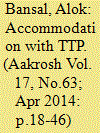

|
|
|
| 2 |
ID:
146389


|
|
|
| 3 |
ID:
102048
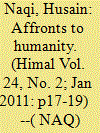

|
|
|
| 4 |
ID:
118644
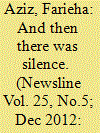

|
|
|
| 5 |
ID:
156917
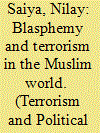

|
|
|
|
|
| Summary/Abstract |
This article examines the effect of blasphemy laws on Islamist terrorism in Muslim-majority countries. Although passed with the ostensibly noble purpose of defending religion, I argue that blasphemy laws encourage terrorism by creating a culture of vigilantism in which terrorists, claiming to be the defenders of Islam, attack those they believe are guilty of heresy. This study empirically tests this proposition, along with alternative hypotheses, using a time-series, cross-national negative binomial analysis of 51 Muslim-majority states from 1991–2013. It finds that states that enforce blasphemy laws are indeed statistically more likely to experience Islamist terrorist attacks than countries where such laws do not exist. The statistical analysis is supplemented with a brief case study of blasphemy laws and terrorism in Pakistan. The conclusion situates the findings in the context of policy.
|
|
|
|
|
|
|
|
|
|
|
|
|
|
|
|
| 6 |
ID:
103302
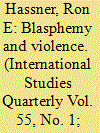

|
|
|
|
|
| Publication |
2011.
|
| Summary/Abstract |
Why did riots in response to the 2005 Danish cartoons depicting the Prophet Muhammad occur in nine Muslim states but not in 43 other states in which Muslims form a majority of the population? I show that the location of the cartoon riots is best explained by combining insights from the study of politics with arguments from the sociology of religion. Protests were mobilized by radical Islamist movements alarmed by the moral threat posed by the blasphemous cartoons. In states characterized by political rights and civil liberties, regimes responded haphazardly to the demonstrations, leading to confrontations between security forces and angry rioters. This finding can be generalized beyond the Muslim world: We should expect reactive religious violence wherever fundamentalist movements are confronted by transgressive acts, committed by threatening opponents, in a political environment that permits protest but fails to protect the religious principles of the movement.
|
|
|
|
|
|
|
|
|
|
|
|
|
|
|
|
| 7 |
ID:
104319
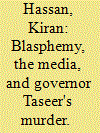

|
|
|
| 8 |
ID:
160066
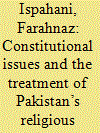

|
|
|
|
|
| Summary/Abstract |
Although Pakistan was created as a homeland for South Asia's Muslims, religious freedom was one of its founding principles. Seventy years later, Pakistan is better known for religious extremism and the persecution of Muslim and non-Muslim religious minorities. Pakistan's blasphemy law is a state-sanctioned tool of religious oppression used to target members of minority faith communities whether Ahmadiya, Christian, Hindu, or Shiite, as well as Sunnis who criticize the law. This paper discusses the blasphemy law and other laws that have led to the state of religious oppression in Pakistan.
|
|
|
|
|
|
|
|
|
|
|
|
|
|
|
|
| 9 |
ID:
187447
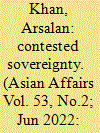

|
|
|
|
|
| Summary/Abstract |
Pakistan has witnessed the rise of a range of Islamic forces that claim to be defending Islam from what they imagine to be a deluge of incidents of blasphemy, a veritable moral panic organized around a set of blasphemy laws pertaining to the regulation and protection of Islam. The violence of blasphemy politics, which is disproportionately directed at sectarian and religious minorities, is predicated on the claim that is the duty and mandate of the state to enforce the blasphemy laws, and where the state fails, the onus falls on ordinary Muslims to fulfill the demands of Islam. In this article, I focus on the response to this blasphemy politics by Pakistani Tablighis, practitioners of the transnational Islamic piety movement the Tablighi Jamaat. Like other Islamic groups in Pakistan, Tablighis consider blasphemy to be a grave sin and a deep threat to the Islamic community, but Tablighis believe that the solution to the growing incidence of blasphemy is to spread virtue through their distinct form of face-to-face preaching (dawat). I show that these different ethical responses to blasphemy reflect different approaches to the relationship between Islam and state sovereignty. Specifically, I argue that blasphemy politics presupposes the sacralization of the state but Islamic piety among Pakistani Tablighis provides an alternative ethical framework for addressing the moral injury of blasphemy.
|
|
|
|
|
|
|
|
|
|
|
|
|
|
|
|
| 10 |
ID:
118625
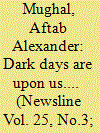

|
|
|
| 11 |
ID:
188958
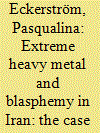

|
|
|
|
|
| Summary/Abstract |
Since the revolution in 1979, the Islamic Republic of Iran has imprisoned musicians, especially punk, hip-hop, and hard rock bands, as well as those playing heavy metal subgenres. Extreme heavy metal artists and fans emerged in the 1990s. The government soon targeted them as Satanists and began a systematic crackdown on metalheads. The metalcore band Confess is the most well-known case. The band was arrested in 2015 on counts of blasphemy, disturbing public opinion through the production of music, participating in interviews with the opposition media and propaganda against the Islamic Republic of Iran, among other charges. The majority of secular countries today do not consider extreme heavy metal to be transgressive. This is not the case in contexts where religious traditions have a significant influence on society. By analysing the narrative of the band Confess, the purpose of this paper is to provide an understanding of how Iranian extreme metal musicians resist religious oppression, challenge their government, religious precepts, and social values through their music.
|
|
|
|
|
|
|
|
|
|
|
|
|
|
|
|
| 12 |
ID:
107407
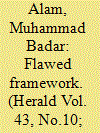

|
|
|
| 13 |
ID:
107410
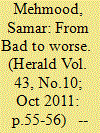

|
|
|
| 14 |
ID:
158942
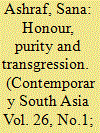

|
|
|
|
|
| Summary/Abstract |
Since the incorporation of anti-blasphemy laws protecting the religious sentiments of the Muslim majority in the Pakistan Penal Code in the 1980s, Pakistan has seen several cases of extra-judicial killings, mob violence and vigilante action against the accused. Based on my fieldwork in Punjab, Pakistan, this paper deals with the meanings associated with blasphemy, and violent action that follows the accusations. Focusing on everyday interactions at a local level, I argue that certain understandings of the notions of honour, shame, purity, and transgression provide meaning as to what constitutes blasphemy and what are desirable courses of action to be taken in response to perceived blasphemy. I further demonstrate how public religious discourse is utilized to mobilize people, by actively legitimizing violence in the name of love, and framing as the hero – a true Muslim – one who can kill for the sake of love and hence is capable of preventing shame by defending the Prophet’s honour.
|
|
|
|
|
|
|
|
|
|
|
|
|
|
|
|
| 15 |
ID:
187257
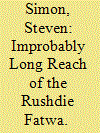

|
|
|
|
|
| Summary/Abstract |
More than 33 years after Ayatollah Ruhollah Khomeini issued the extraordinary fatwa calling for Salman Rushdie’s death for blaspheming Islam in The Satanic Verses, a Lebanese-American man attacked and badly injured Rushdie in upstate New York. Although the attacker may have drawn some inspiration from Iran’s hostility towards Rushdie, and the attack did coincide with the discovery of Iranian plots to assassinate American officials in retaliation for the killing of Qasem Soleimani, there is no evidence that Iran or any Iranian proxy was involved, and there seemed to be no information about active threats. Iran’s response to the attack was malicious and provocative, but its condemnation of blasphemy is hardly unique or surprising. It is unrealistic for some Western commentators and officials to conclude that Iran’s vendetta against Rushdie means it cannot be trusted to abide by a revived Joint Comprehensive Plan of Action.
|
|
|
|
|
|
|
|
|
|
|
|
|
|
|
|
| 16 |
ID:
102283
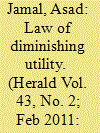

|
|
|
| 17 |
ID:
102284
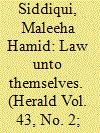

|
|
|
| 18 |
ID:
107408
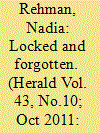

|
|
|
| 19 |
ID:
104489
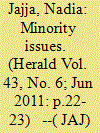

|
|
|
| 20 |
ID:
118862
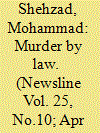

|
|
|